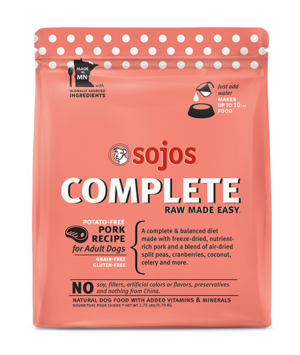Sojos Complete Pork Recipe For Adult Dogs Review
PawDiet has been helping pet owners since 2015. To fund our efforts, articles may include affiliate links; if you buy something through a link, we may earn a commission.
Review of Sojos Complete Pork Recipe For Adult Dogs
According to our data, this Sojos recipe provides complete & balanced nutrition for the maintenance of adult dogs. In other words, this formula is AAFCO approved.
Sojos Complete Pork Recipe For Adult Dogs is formulated to meet the nutritional levels established by the AAFCO Dog Food Nutrient Profiles for the maintenance of adult dogs.
Review of Ingredients
In our review of Sojos Complete Pork Recipe For Adult Dogs, we'll examine all 21 ingredients and highlight the nutritional contribution of each ingredient.
While the first few ingredients typically dominate the recipe's composition, ingredients in small quantities can still have a meaningful impact on the overall nutritional profile of the recipe.
Pork is a high-quality source of protein, essential for muscle development and maintenance, and provides vital nutrients for your dog's overall health.
Yellow split pea is a great source of plant-based protein, dietary fiber, and essential vitamins and minerals, which help support your dog's overall health and digestive system.
Whole egg powder is a complete protein source, providing all essential amino acids and important nutrients, such as choline and biotin, for your dog's health.
Parsnip is a nutrient-rich root vegetable that provides essential vitamins, minerals, and fiber for your dog. It supports a healthy digestive system, promotes a strong immune system, and contributes to overall health and vitality.
Cranberry is a fruit that can provide your dog with antioxidants, fiber, and vitamin C, promoting urinary tract health and boosting their immune system.
Flaxseed is an excellent source of omega-3 fatty acids, dietary fiber, and essential nutrients, which can support your dog's skin, coat, and digestive health.
Coconut is a source of healthy fats and dietary fiber, which can support digestion, skin and coat health, and provide a natural energy source for dogs.
Celery is a low-calorie vegetable that provides vitamins and fiber, supporting your dog's digestive health.
Tricalcium phosphate is used as a calcium supplement in dog foods, contributing to strong teeth and bones.
Ginger is a natural anti-inflammatory and digestive aid that can help soothe your dog's stomach and support their overall gastrointestinal health.
Dried kelp is a natural source of essential minerals and trace elements, which help support your dog's thyroid function and overall health.
Kale is a nutrient-rich leafy green packed with vitamins, minerals, and antioxidants to support a strong immune system, healthy skin, and coat in dogs.
Zinc sulfate is a source of the essential mineral zinc, which supports your dog's immune system, skin and coat health, and overall growth and development.
Vitamin E supplement is an essential nutrient that helps support your dog's immune system, skin health, and overall wellness.
Ferrous fumarate is a supplemental form of iron often added to dog food to support optimal health. Iron is an essential nutrient for your dog, as it plays a vital role in the production of red blood cells, oxygen transport, and energy metabolism.
Copper sulfate is an essential trace mineral that supports various bodily functions in dogs, including immune system health, skin and coat maintenance, and red blood cell production.
D-Calcium Pantothenate is a source of pantothenic acid, a B-vitamin that helps in energy metabolism and the synthesis of important compounds in the body.
Riboflavin, also known as Vitamin B2, is essential for energy production, cell function, and fat metabolism in your dog's body.
Vitamin D3 supplement is an essential vitamin that supports bone health, immune function, and overall well-being in dogs. It helps regulate calcium and phosphorus balance in the body, promoting strong and healthy bones.
Pyridoxine hydrochloride is a source of vitamin B6, which is essential for your dog's nervous system function, immune health, and red blood cell production.
Folic acid is a crucial B-vitamin that aids in the synthesis of DNA and supports healthy cell growth. It's essential for maintaining your dog's overall health, particularly during periods of rapid growth.
Review of Guaranteed Analysis
The Crude Protein value of 27.00% is likely contributed by the pork, which is the first ingredient and a high-quality source of animal protein. Whole egg powder is also a significant contributor to protein content. Both of these ingredients are rich in essential amino acids necessary for a dog's muscle development and overall health.
Crude Fat at 15.00% could be primarily coming from the pork as well, since animal meats are known to contain fats that are crucial for a dog's diet. Additionally, flaxseed and coconut are good sources of healthy fats, including omega-3 and omega-6 fatty acids, which contribute to the skin and coat health of the dog.
The Crude Fiber maximum of 5.00% is likely due to the inclusion of yellow split peas, parsnips, celery, and kale. These plant-based ingredients provide dietary fiber which is important for digestive health. Fiber helps to regulate bowel movements and can aid in maintaining a healthy weight.
Calories amounting to 3862.00 per kg indicate the energy content of the food. The caloric content is influenced by the combination of proteins, fats, and carbohydrates present in the ingredients. Ingredients like pork, yellow split peas, and whole egg powder are calorie-dense, contributing to the overall energy value of the food.
Other ingredients like tricalcium phosphate, ginger, dried kelp, and the various vitamin and mineral supplements are included to ensure a balanced diet, providing essential nutrients but not significantly affecting the guaranteed analysis values of protein, fat, and fiber. These components are more about ensuring the food meets the nutritional requirements for vitamins and minerals rather than contributing to the macronutrient profile.

